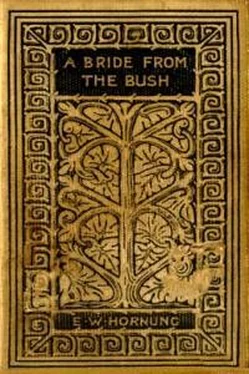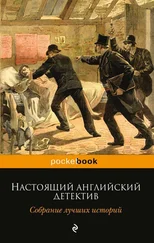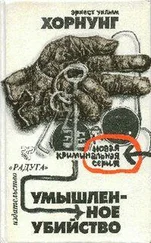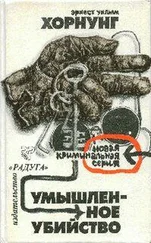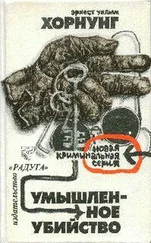Official investigation had thus far discovered what a person of average intelligence, with a little more presence of mind than Alfred had shown, might have ascertained, perhaps for himself. Yet the information was important. Gladys had left the train, with her luggage, two stations before her destination. This was testified by the guard of the train. But there was a later fact still. It was certain that Gladys had returned to town by the next up–train: for she had personally deposited her luggage in the cloak–room at Liverpool Street between the hours of six and seven on the Saturday evening. There all trace of her was lost, for the present; but it was extremely likely that fresh traces would be forthcoming during the course of the day.
The simple nature of the inquiries that had elicited the above information will be at once apparent; but Alfred went away with an exalted opinion of the blood–hound sagacity of the police. In his present condition of mind, his opinion, good or bad, was not worth much. He went to a club which he had not been in for years, and of which he had long ceased to look upon himself as a member; but his bankers, doubtless, still paid his subscription; and in any case it was not likely that he would be turned out. He would find some quiet corner and sit down and wait until the messenger came from Scotland Yard; for, of course, something more would be discovered during the course of the day—had they not promised as much? The quiet corner that he chose was an upstairs window, from which there was a fair glimpse of the river. The river fascinated him most strangely to–day. During the hour he had loitered on the Embankment, between ten and eleven, he had raised his eyes but seldom from the river.
He sat long at the window—so long that minutes ran into hours and the summer afternoon melted into the summer evening. The room was a reading–room; the windows were in snug recesses. Alfred had his recess to himself for hours and hours. He was conscious of no other presence; certainly no one spoke to him: very possibly, with his beard, no one recognised him.
The sun was sinking. He could not see it from this window; but he could see the heightened contrast of light and shadow among the ripples of the river, and the shadows deepening far away under Westminster Bridge. This was where his gaze rested. It was a stony gaze; his lips were compressed and bloodless, his features pointed and pale. A hideous vision filled his mind; but it was a vision only; it had no meaning. He did not realise it. He realised nothing…. Some one came and asked if he was Mr. Bligh. It was a club servant. A man awaited him below. Alfred went down; the messenger from Scotland Yard was come at last.
The messenger was the bearer of these few words:—
"A lady's hat and jacket have been found in the river below Blackwall. If you wish to see them, they are here."
Five minutes later Alfred walked into the office in which he had heard the result of the investigations that morning, and identified instantly the jacket and hat awaiting his inspection.
Gladys had gone away in them on Saturday.
Chapter 17
Waiting for the Worst
For the second time, it was Granville whom Alfred first encountered on his return from town. They met in the twilight. Dinner was over, and Granville sauntered alone in the bit of garden between the house and the road, smoking a cigarette. Suddenly the gate was opened, and the one brother, looking up, saw the other coming quickly towards him through the dusk.
It was too dark for the ready reading of faces; but it struck Granville that the approaching footsteps were hasty and unusual. He recalled Alfred's unaccountable manner of the night before. Indeed, all his movements, during the past two days, were mysterious: up to London first thing in the morning, back late, and not a word to any one; whereas the whole household, as a general rule, were in possession of most of Alfred's private plans and hopes and fears. But Granville had no time to speculate now. Alfred came straight up to him.
"I want to speak to you, Gran," he said. "I'm glad I found you here."
The step had been suspicious; the voice was worse. It was calm enough, but it was not Alfred's voice at all. Something had happened. Granville put up his eyeglass; but in that light it did not avail him much.
"Let us sit down, then," said Granville, leading the way to a seat under the trees.
"What is it about?"
Then Alfred began, in set tones and orderly phrases. The affectation of his manner was almost grotesque.
"I want a kind of professional opinion from you, Gran, about—let us say, about a case that interests me, rather. That will be near enough to the mark, I think."
"Delighted to help you, if I can." Granville lounged back carelessly on the garden–seat, but his keen glance lost not a line of the other's profile, as Alfred bent forward with his eyes upon the ground; and those lines seemed strangely hardened.
"Thank you. The case is, briefly, this," Alfred continued: "somebody—no matter who—has been missing for some days. The number of days is of no consequence either. The police were not informed immediately. They only heard of it last night. But, this afternoon, they found—"
Alfred checked himself, sat upright, shifted his position, and met Granville's gaze.
"What should you consider incontestable evidence of drowning, Gran?"
"The body."
"Of course. But you have to look for bodies. What should you find, to make you search with the absolute certainty of discovering the body at last?"
"Nothing else could make it an absolute certainty. But lots of things would set you searching—a hat, for instance."
"They have found her hat!" said Alfred, through his clenched teeth.
" Her hat! Whose?"
Alfred stretched over, caught Granville's arm in a nervous grip, and whispered rapidly in his ear. In a moment Granville knew all. But he did not speak immediately. When he did speak, it was to ask questions. And there was another unnatural voice now, besides Alfred's—Granville's was quite soft.
"Was she unhappy at all?" he asked.
"Just the reverse, I thought, until last week. You know what happened in the Park yesterday week. She said some very wild things after that, and spoke as though she had never been quite happy here; she vowed she would never forgive herself for what she had done; and she said she wished she was dead. Well, I did not think much about her words; I thought more of what she had done; I put down what she said to the shame and temper of the moment, not to real unhappiness. But, when I said good–bye to her, then she was unhappy—more so than I ever knew her before."
From his tone, no one could have guessed that he was speaking of his wife.
"And you think she—she—"
Granville could not bring his lips to utter the words.
Alfred could. "I think she has drowned herself," he said calmly.
Granville shuddered. Callous as he was himself by nature, callousness such as this he could not have imagined possible; it was horrible to see and to hear.
Neither spoke for some little time.
"Did it never occur to you," said Granville, at last, "that she might have drowned herself without all this trouble, simply by walking to the bottom of the garden here?"
"What?" cried Alfred, sharply. His fingers tightened upon Granville's arm. His voice fell, oddly enough, into a natural tone.
Granville repeated his question.
"No," said Alfred, hoarsely, "that never crossed my mind. But there's something in it. God bless you, Gran, for putting it into my head! It's almost like a ray of hope—the first. If I hadn't seen the things and identified them as hers—"
"The things! You did not say there was anything else besides the hat. What else was there?"
Читать дальше
